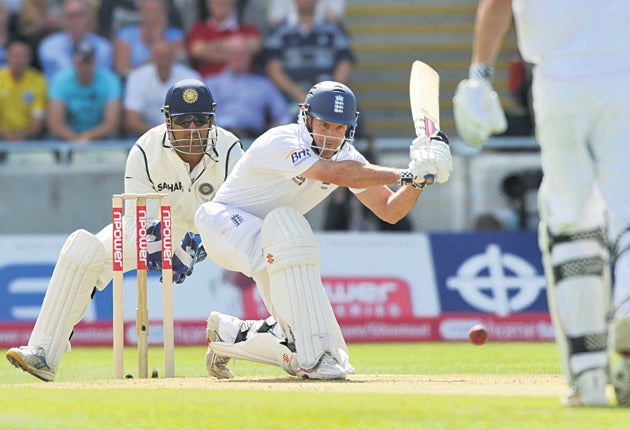James Lawton: England have been excellent, but any test of greatness is yet to come

Pore back through all the records, confront the deeds of great men like Hobbs and Sutcliffe, Compton and Botham, and you are still not likely to find more than a handful of occasions. When, that is, English cricket took the kind of command they enjoyed here in the mellow sunshine of last evening.
Kevin Pietersen looked immense once more, hitting a towering six and accelerating as a Ferrari might come through the lower gears.
Alastair Cook had found again the appetite for run-gorging so vital to the crushing of Australia last winter Down Under.
Local hero Ian Bell, the centre of so much controversy in the last Test at Trent Bridge after allowing a most beautiful knock to lapse into something close to farce, went for a mere 34 as he attempted to make a memorial of an innings in tribute to his long-time batting mentor Neal Abberley, who died at the start of this week.
Bell could only manage a cameo tribute but it shone jewel-like before he was bowled by Praveen Kumar, the one Indian cricketer who didn't seem overwhelmed by the pressure yesterday and would later claim the wicket of Pietersen when he reached 63 and England were 374 for 3.
Soon enough England had moved past 400 and exerted the kind of authority and fierce competitive edge which had already brought them crushing victories at Lord's and Trent Bridge in the first two Tests.
That was a milestone which put into another perspective the advantage England have established against the team who came here ranked No 1 in the world – a distinction which seems certain to crumble utterly here and at the Oval next week.
Despite enjoying the services of three of the greatest batsmen of all time, Sachin Tendulkar, Rahul Dravid and VVS Laxman, India have now failed to pass 300 in each of their five innings. They have failed, utterly, to be competitive after coming off the treadmill of their one-day World Cup triumph and the big money Twenty20 India Premier League.
But then if you happen to think this must be merely disappointing for all those admirers across the world who responded to the artistry of their batting and the guile of their bowling as they overtook an Australian team weakened so desperately by the departure of men like Shane Warne and Glenn McGrath, you need to spend a little time on the terracing of this spectacularly refurbished cricket arena.
Here, you see that the reaction runs a little deeper than passing disgruntlement. There is a feeling, we should be honest, of betrayal.
Next summer, in the shadow of the London Olympics, the South Africans come here for a shortened, three-match series which should give us a much better guide to the realities of cricket power.
Unfortunately, what we are enduring here – and surely face another repetition of at the Oval – is no such investigation. It is a series of formal statements about how the money-inspired preoccupation with Twenty20 cricket has seduced an Indian team which was so brilliant so recently.
Some of the Indian cricket was so poor, so lacking in spirit or technical accomplishment, the prevailing reaction, it seemed, was to look away. This is never a challenge for some detachments of the Barmy Army of course, particularly the most enthusiastic of the cross-dressers who always have a new rival line to admire or despise.
For those who came more intent on watching cricket, and perhaps being moved by evidence that they were observing not one team of great talent and spirit but two, the problem was plainly one which permitted no easy diversion.
There were cries, even gasps of disappointment at some examples of the atrophied state of Indian cricket, of fielding that might have earned a rebuke on a well-ordered village green.
There also had to be a degree of sympathy for the team which has dominated the series so profoundly. As Cook drew closer to a double hundred, as in the company of Eoin Morgan he took his team to a lead of more than 200 runs with seven wickets still standing, you could only regret that when they reached the mountain top finally they would have a dilemma. They wouldn't be sure whether it was more appropriate to plant a flag of St George or recognise a white one announcing surrender.
One point not in dispute was the splendid consistency of the English effort. They have moved from one challenge to another with quite relentless application. They have learned from their mistakes and grown formidably strong at some severely broken places.
They have done the great and honest thing. They have geared themselves to the challenge of fighting to be the best in the world. It is not their fault that the fight, each successive round of it, grows ever more fraudulent.
Subscribe to Independent Premium to bookmark this article
Want to bookmark your favourite articles and stories to read or reference later? Start your Independent Premium subscription today.

Join our commenting forum
Join thought-provoking conversations, follow other Independent readers and see their replies